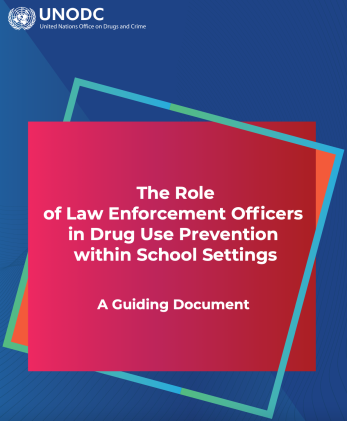Поиск
Reduce Drug Related Crime
Community-based treatment, care, and supervision for people with substance use problems who are involved with the justice system.
Trajectories of Substance Use Disorder in Youth After Detention: A 12-Year Longitudinal Study
Abstract
Objective
To identify trajectories of substance use disorders (SUDs) in youth during the 12 years after detention and how gender, race/ethnicity, and age at baseline predict trajectories.
Method
As part of the Northwestern...
Prevalence, comorbidity, and continuity of psychiatric disorders in a 15-year longitudinal study of youths involved in the juvenile justice system.
Abstract
Importance Previous studies have found that one-half to three-quarters of youths detained in juvenile justice facilities have 1 or more psychiatric disorders. Little is known about the course of their disorders as they age.
Obje...
Child incarceration and long-term adult health outcomes: a longitudinal study
Abstract
Purpose
Although incarceration may have life-long negative health effects, little is known about associations between child incarceration and subsequent adult health outcomes. The paper aims to discuss this issue.
Design
...Key substance use and mental health indicators in the United States: Results from the 2022 National Survey on Drug Use and Health
The Substance Abuse and Mental Health Services Administration (SAMHSA) presents Key Substance Use and Mental Health Indicators in the United States: Results from the 2022 National Survey on Drug Use and Health. The National Survey on Drug...
Lifetime prevalence of mental disorders in US adolescents: results from the National Comorbidity Survey Replication–Adolescent Supplement (NCS-A).
Abstract
Objective: To present estimates of the lifetime prevalence of DSM-IV mental disorders with and without severe impairment, their comorbidity across broad classes of disorder, and their sociodemographic correlates.
Method: The...
Statewide trends of trauma history, suicidality, and mental health among youth entering the juvenile justice system
Abstract
Purpose
This study used Washington statewide administrative data to document the prevalence and trend of trauma history, suicidality, and mental health problems among all youth ordered to probation for the first time between 2011...
Mental disorders among adolescents in juvenile detention and correctional facilities: a systematic review and metaregression analysis of 25 surveys
Abstract
Objective: To systematically review and perform a meta-analysis of the research literature on the prevalence of mental disorders in adolescents in juvenile detention and correctional facilities.
Method: Surveys of psychiatric...
Co-responding Police-Mental Health Programs: A Review
ABSTRACT
Co-responding police-mental health programs are increasingly used to respond to ‘Emotionally Disturbed Persons’ in the community; however, there is limited understanding of program effectiveness and the mechanisms that promote...
Psychiatric disorders in youth in juvenile detention.
Abstract
Background
Given the growth of juvenile detainee populations, epidemiologic data on their psychiatric disorders are increasingly important. Yet, there are few empirical studies. Until we have better epidemiologic data, we cannot...
Community-based alternatives for justice-involved individuals with severe mental illness: Diversion, problem-solving courts, and reentry
ABSTRACT
Purpose
Adults with severe mental illness are overrepresented in the criminal justice system, and traditional criminal justice processing has not led to meaningful improvement in recidivism and other relevant outcomes...
Alcohol and drug use and treatment reported by Prisoners: Survey of Prison inmates
Among all state and federal prisoners (1,421,700), nearly 4 in 10 (38%) reported using drugs and 3 in 10 (30%) reported drinking alcohol at the time of the offense for which they were serving a sentence (figure 1, table 1). Statistics in...
Co-responding Police-Mental Health Programs: A Review
ABSTRACT
Co-responding police-mental health programs are increasingly used to respond to ‘Emotionally Disturbed Persons’ in the community; however, there is limited understanding of program effectiveness and the mechanisms that promote...
NIJ's Multisite Evaluation of Prosecutor-Led Diversion Programs: Strategies, Impacts, and Cost-Effectiveness
ABSTRACT
In recent years, a growing number of prosecutors have established pretrial diversion programs, either before charges are filed with the court or after the court process begins, but before a disposition. This project's design...
The Sequential Intercept Model and Juvenile Justice: Review and Prospectus
ABSTRACT
Behavioral health needs in justice-involved adolescents are an increasing concern, as it has been estimated that two-thirds of youths in the juvenile justice system now meet the criteria for one or more psychological disorders...
Use of the Sequential Intercept Model as an Approach to Decriminalization of People With Serious Mental Illness
The Sequential Intercept Model provides a conceptual framework for communities to use when considering the interface between the criminal justice and mental health systems as they address concerns about criminalization of people with mental...
The effects of specialized probation and recovery management checkups (RMCs) on treatment participation, substance use, HIV risk behaviors, and recidivism among female offenders
ABSTRACT
Objectives
To examine the effects of specialized probation and recovery management checkups (RMCs) on participation in substance use treatment, substance use, HIV risk behaviors, and recidivism.
Methods
Women (n = 480) released...
The effectiveness of diversion programmes for offenders using Class A drugs: a systematic review and meta-analysis
ABSTRACT
Aims: To review existing evidence on effectiveness of community-based diversion programmes for Class A drug-using offenders.
Methods: 31 databases were searched for studies published 1985–2012 (update search 2012–2016) involving...
Drug court utilization of medications for opioid use disorder in high opioid mortality communities
ABSTRACT
Introduction
A 2012 national survey found low utilization of medication for opioid use disorder (MOUD) in US drug courts. This study provides an update on MOUD policies and practices among drug courts in communities that the...
A Qualitative Interpretive Meta-Synthesis (QIMS) of women’s experiences in drug court: Promoting recovery in the criminal justice system
ABSTRACT
Drug courts have been part of the criminal justice system for over 30 years. A plethora of quantitative quasi-experimental, experimental, and meta-analytic studies have demonstrated their effectiveness at promoting recovery from...
Reporting of substance use treatment quality in United States adult drug courts
ABSTRACT
Background
Adult drug courts are growing in popularity within the Unites States, but the quality of substance use treatment within drug court programs and the impact of drug courts on health and substance use treatment outcomes...
Поделитесь знаниями: Члены ISSUP могут размещать информацию в разделе "Обмен знаниями" - зарегистрируйтесь или станьте членом организации


